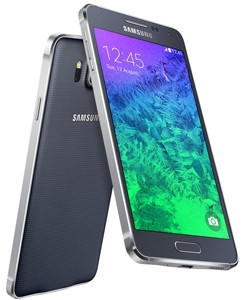
Samsung has been known for using excessive amounts of plastic in its mobile devices. When done right, plastic can be a durable material and still offer pleasant aesthetics. Nonetheless, the general opinion on Samsung's use of plastic has been mainly negative. Apple, on the other hand, decided to equip its devices with more luxurious materials like brushed aluminium, and is being praised for that.
For a long time Samsung didn't seem to care about the general opinion on its fascination with plastic, but with the announcement of the Galaxy Alpha smartphone, it finally broke its design tradition and incorporated some metal. Does this make the Galaxy Alpha a premium business device, and how does it stack up to similar sized and priced devices?
To find that out, we intensively worked with the Samsung Galaxy Alpha for a full week. During that time, we primarily used it for typical business tasks and office activities like communicating, browsing and handling various types of documents and spreadsheets.
Look and feel
In terms of design, Samsung clearly aims to distinguish the Galaxy Alpha from previous models, like the Galaxy S5, by equipping it with an aluminium frame ? the only exterior part of the phone that used to be plastic and is now made of metal. The company really should have gone all the way and replaced the back with aluminium as well.
The sharp edges and hard touch of this frame have a negative effect on the way it feels in your hand - previous Galaxy models with a plastic frame offered a slightly more comfortable grip. Still, the Galaxy Alpha feels sufficiently solid and should have no problem surviving the roughest of office days or business trips.
The plastic back cover is removable, just like with previous Galaxy smartphones, and facilitates quick and easy changing of the battery.
For a 4.7-inch smartphone, the Galaxy Alpha has a surprisingly compact design. It is considerably thinner and lighter (6.7mm, 115g) than the Galaxy S5 (8.1mm, 145g). It measures only 65mm wide, which is significantly less than the Galaxy S5 (72.5mm), or any other high-end Android smartphone for that matter. This makes it easy to hold it in one hand and use your thumb to control it.
Storage and security
Unlike all previous Samsung smartphones, the Galaxy Alpha doesn't offer a micro-SD expansion slot beneath the battery, which seems like a missed opportunity. We're glad Samsung decided to put 32GB of storage in the Galaxy Alpha, of which 26GB is available for user files and content. However, there is no way to expand the storage capacity, making it less future-proof than previous Galaxy phones and unqualified for business users who work with big files. We would have liked to see a combination of 32GB on-board storage with a micro-SD option.
The built-in fingerprint scanner on the home-button requires you to swipe your finger instead of touching it. As with our review of the Samsung Galaxy Note 4, we weren't impressed with this approach. Using the fingerprint scanner on the Galaxy Alpha requires precision and in no way does it work smoothly or fast, no matter how many times you practise. Ultimately, it's faster to type in your password.
These flaws make the fingerprint scanner on the Galaxy Alpha undeniably inferior to those of the iPhone 5s and 6 (Plus) or the Huawei Ascend Mate 7. Business users required by their corporate IT-department to make use of biometric security, should avoid the Galaxy Alpha.
Middle-of-the-road performer
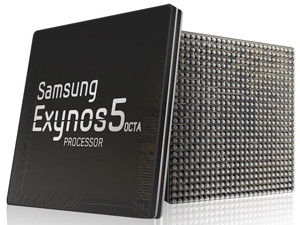
The Galaxy Alpha is equipped with Samsung's own octa-core Exynos 5430 chip that utilises the same big.LITTLE technology we first encountered in the Huawei Ascend Mate 7. This new technology automatically and seamlessly moves workloads to the appropriate cores. During light workload, the four 1.3GHz Cortex A7 cores kick in, while with heavy workload the four 1.8GHz Cortex A15 cores take over. In theory, it should also be possible to have all eight cores working simultaneously, but with modern smartphones that kind of computing power is currently unnecessary (anyhow, it would have a disastrous effect on battery life.)
To find out how fast the Galaxy Alpha actually is, and to be able to compare it to other devices, we ran a set of benchmark tests. The first, Geekbench, simulates real-world business and consumer scenarios to determine and quantify the actual (multi-core) processing power. This test showed us the Galaxy Alpha isn't a top performer. The iPhone 6, iPhone 6 Plus, Galaxy Note 4, Galaxy S5 and HTC One (M8) all outperform the device.
Our second benchmark tool is Peacekeeper, which also factors in the performance of the operating system and browser, aside from the hardware. It shows similar results ? the Galaxy Alpha is considerably slower than the iPhone 6, iPhone 6 Plus, Galaxy Note 4, HTC One (M8) and LG G3. We then ran the Kraken benchmark that also measured the performance of the hardware, operating system and browser. This time, only the iPhone 6 and iPhone 6 Plus were able to outperform the Galaxy Alpha. Both the Galaxy Note 4 and Galaxy S5 proved slightly slower than the Alpha in this specific benchmark.
Finally, the GFXBench software tests how the GPU (graphical processing unit) handles complex 3D-graphics. It turns out the Alpha renders graphics pretty well, sometimes even outperforming more expensive, high-end phones like the iPhone 6 Plus, HTC One (M8), Galaxy Note 4 and the Galaxy S5. The Galaxy Alpha does, however, offer a lower screen resolution than all of these high-end devices.
All in all, our tests show the Galaxy Alpha isn't the fastest smartphone around. The good news is it doesn't have to be: it offers more than enough horsepower for both typical and heavy business tasks and activities like communicating, browsing and reading/editing documents. Navigation is fluid, opening apps (and switching between them) is smooth, and there is no lag or stuttering whatsoever.
The Galaxy Alpha is one of the few smartphones that already supports 4G/LTE Cat6 networks, also known as 4G+ or LTE Advanced. This new, faster version of 4G/LTE, which is currently being rolled out in parts of Europe and the US, isn't yet available in SA, but it seems inevitable and only a matter of time before it will be. This makes the Galaxy Alpha especially interesting for business users who are dependent on the fastest connection available.
Inadequate battery life
Battery life is a key consideration for business users. Samsung surprisingly decided to equip the Galaxy Alpha with a relatively small capacity battery of just 1 860mAh. To put things into perspective, the Samsung Galaxy Note 4 uses a 3 220mAh battery, the Sony Xperia Z3 Compact has a 3 100mAh version, the Apple iPhone 6 Plus works on a 2 900mAh model and the HTC One (M8) houses a 2 600mAh battery.
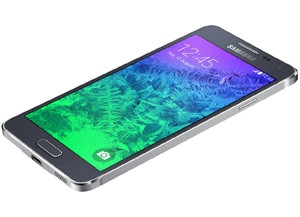
To find out if the previously-mentioned big.LITTLE technology might be able to compensate for the disappointing battery capacity, we exposed the Samsung Galaxy Alpha to our battery-test. This test aims to drain the battery as fast as possible by using business and office tasks and activities. It effectively creates a worst-case scenario; the minimal time the device can be used for business-related tasks.
Our test, unfortunately, revealed the inevitable result of the low-capacity battery as well as the incompetence of the octa-core Exynos 5430's big.LITTLE technology to compensate for that shortcoming. When continuously using the Galaxy Alpha for business tasks and activities, it will last for just six hours. Similar-sized smartphones lasted considerably longer: the iPhone 6 can run for seven-and-a-half hours, and the Sony Xperia Z3 Compact for nine-and-a-half.
Even those business users who don't heavily depend on their smartphones continuously throughout the day will find the Galaxy Alpha barely able to reach the end of a standard eight-hour working day.
Screen lacks premium resolution
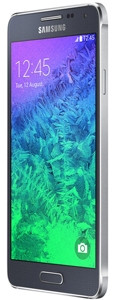
The Galaxy Alpha houses a 4.7-inch screen with a resolution of just 1 280 x 720, resulting in a pixel density of 312ppi - not bad at all, and only slightly less than that of the iPhone 6 (1 334 x 750, 326ppi) but unable to impress for a premium device. The 5.0-inch HTC One (M8) for instance, is only slightly bigger but still manages to display an impressive 1 920 x 1 080 pixels and 440ppi density.
The Galaxy Alpha features Samsung's own Super Amoled display technology. One of its distinctive properties is intensive contrast levels that produce very vibrant colours, almost to an unnatural degree. Luckily, adjusting the screen settings can tone this down. The screen also offers excellent brightness level making the Galaxy Alpha perfectly usable in light-intensive situations, like on a sunny day or in a bright office. Colour reproduction is excellent, although the default colour setting (called Dynamic) displays too much saturation. This can be easily fixed by changing the colour scheme to standard settings.
Business users will find the screen of the Galaxy Alpha to be sufficient, but no more than that. Text and images aren't as razor sharp as on other premium smartphones of similar size, like the iPhone 6, HTC One (M8) or the Sony Xperia Z3 Compact.
Camera and software
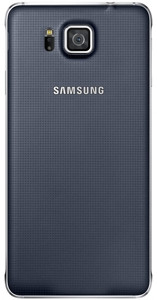
The 12MP rear camera on the Galaxy Alpha can be used to shoot pictures and 1 080p full-HD video. It features Samsung's new Isocell sensor technology that should, theoretically, deliver better pictures and video quality as well as faster auto-focus.
After our test-run with the Galaxy Alpha's rear camera, we found the photo and video quality to be quite impressive for a smartphone. All captured material showed great detail and colours, given there was ample light available. Despite the on-board LED-flash, the quality quickly diminishes in low-light situations. We were also pleasantly surprised by the auto-focus, which worked very fast. The 2.1MP camera on the front of the Galaxy Alpha is good enough for a proper Skype call with a colleague or business contact, as long as the room has enough light.
The Galaxy Alpha comes pre-installed with Android 4.4.4 and is topped off with Samsung's own TouchWiz interface, which you either love or hate. The device is overloaded with all kinds of pre-installed features and apps, some of questionable quality and functionality. It offers features like Air View, Multi-Window and Toolbox, plus a multitude of other options. The challenge is to find the useful ones between all the experimental and trial balloon versions that seem to come directly from Samsung's marketing machine.
Verdict
Samsung has succeeded in delivering a fairly compact, durable and lightweight 4.7-inch smartphone with a slightly more sophisticated look and feel than other Galaxy devices. We think it's a missed opportunity that Samsung didn't go all the way by supplying it with an aluminium back cover, instead of just the frame. Another sorely-missed opportunity is the lack of expandable storage capacity. This shortcoming, despite the standard 32GB on-board storage, makes the device very limited, far from future-proof and unqualified for storage-hungry business users.
The Galaxy Alpha has quite a decent camera that can take great pictures and videos, as long as there is ample light. The fingerprint scanner, on the other hand, is often reluctant to co-operate and therefore useless. The screen is able to display vivid colours and high brightness, but can't impress with razor-sharp text and images.
Its biggest flaw is the disappointing battery life, making it absolutely unsuitable for demanding business users who continuously require their smartphone throughout the day or frequently work overtime. Even with typical business or office use the Galaxy Alpha may not make it to the end of the day. This problem can be mitigated with a secondary battery though, but that solution completely lacks any form of elegance.
Share